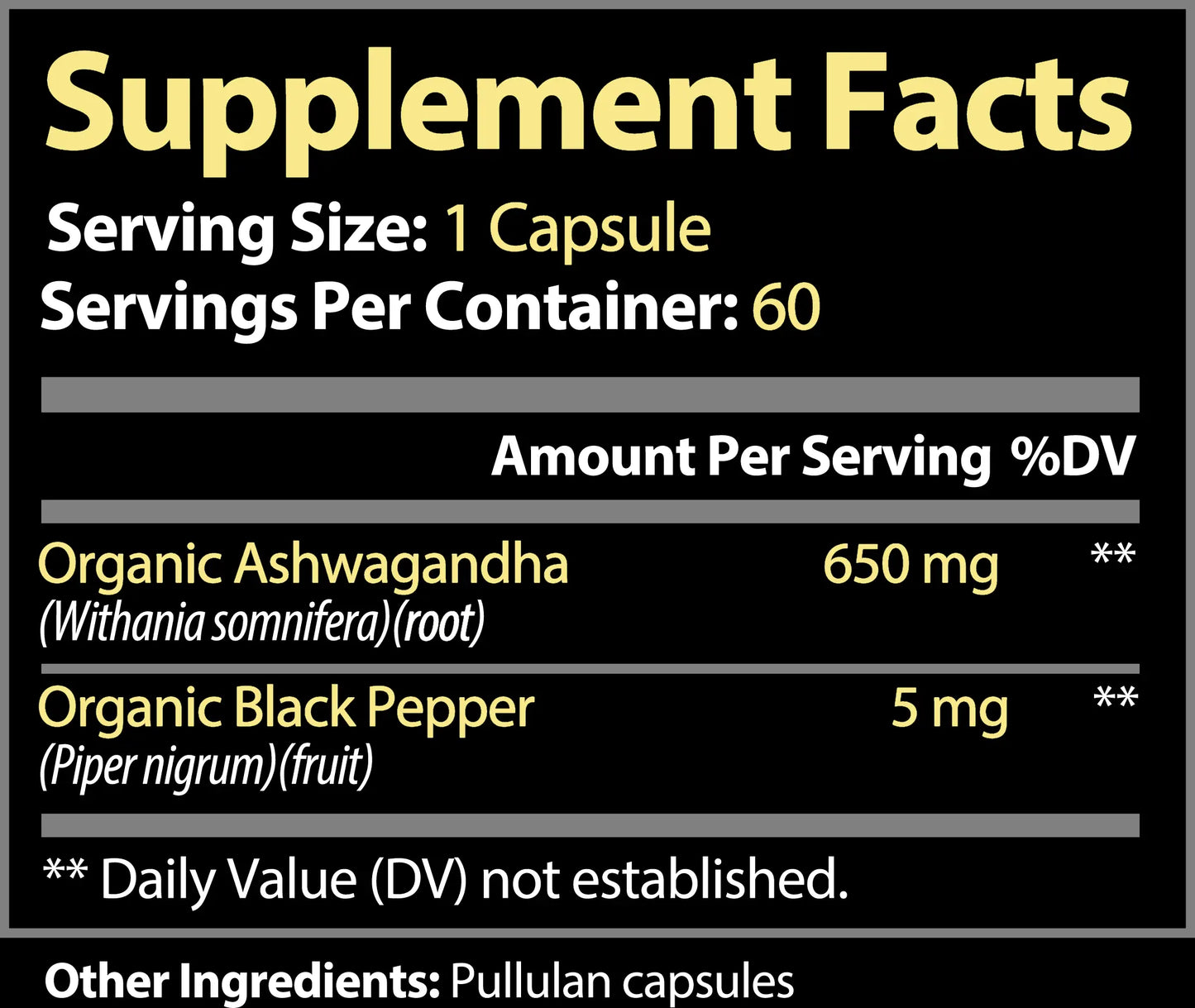
Ashwagandha for 😴Sleep: Unlock Restful Nights Naturally
Share
Struggling with restless nights or poor sleep quality?
Ashwagandha (Withania somnifera) is a powerful ancient herb and a popular adaptogenic natural remedy that has been used as a key herb in Ayurvedic medicine for over 3000 years to promote overall well-being and improve various aspects of health.
Modern scientific studies confirm its ability to improve sleep quality, reduce anxiety, and boost mental alertness upon waking. For those seeking a scientifically proven way to enhance their sleep, ashwagandha quickly becomes a go-to option.

Is Ashwagandha Good for Sleep?
Yes, ashwagandha is effective for sleep, as supported by multiple scientific studies. [1, 2, 3, 4, 5, 6, 7] (read below in detail)
Research shows that ashwagandha extract significantly improves sleep quality, reduces sleep onset latency, and enhances overall sleep efficiency. These benefits are most pronounced in individuals with insomnia or anxiety.
Moreover, ashwagandha doesn’t just promote restful sleep. It also enhances mental alertness upon waking and supports general well-being, making it a comprehensive solution for better sleep health.
🔬 Mechanisms of Action
Stress Management🧘
Ashwagandha is classified as an adaptogen, meaning it modulates cortisol (stress hormone) levels, which, in turn, calms the nervous system and improves falling asleep and sleep quality. [9, 10, 11]

Changes in Cortisol and other hormone levels after 60 days of 240 mg Ashwagandha extract intake (adapted from Lopresti, A. L. et al., 2019)
Antioxidant and Anti-inflammatory Effects🍀
The plant's antioxidant compounds help combat oxidative stress by neutralizing free radicals. [12, 13]
Withanolides in Ashwagandha exhibit anti-inflammatory activity by inhibiting pro-inflammatory cytokines. [14, 15]
Both antioxidant and anti-inflammatory effects can support brain health by reducing oxidative stress and neuroinflammation in the brain cells — neurons.
 Antioxidant and Anti-inflammatory effects of Ashwagandha (adapted from Guo, S. et al., 2024)
Antioxidant and Anti-inflammatory effects of Ashwagandha (adapted from Guo, S. et al., 2024)
Neuroprotective Effects🧠
Also, studies on animals and cell cultures have shown that Ashwagandha-root extract can promote a neuroprotective effect not only via antioxidant and anti-inflammatory effects, but also directly by supporting neuronal health. [16, 17, 18]
Human studies
There were 6 randomized controlled trials on the effect of ashwagandha on sleep quantity and quality [1, 2, 3, 4, 5, 6], containing 430 participants in total:
- Compared to the placebo group participants, the participants receiving Ashwagandha had significant improvement in sleep quality [1]
- ...Significant improvement was observed in all other sleep parameters, i.e., sleep onset latency, sleep efficiency, Pittsburgh Sleep Quality Index and Hamilton Anxiety Rating Scale, with Ashwagandha root extract treatment for 10 weeks, in patients with insomnia at a dose of 300 mg extract twice daily. [2]
- ...upon intervention, a significant increase in the quality of sleep and mental alertness was observed in the Ashwagandha treatment group (600 mg/day) when compared to the placebo group. Overall improvement was observed for the general wellbeing, sleep quality, and mental alertness in the study population. [3]
- ...group treated with ashwagandha showed significant improvement in sleep efficiency, total sleep time and sleep latency, versus placebo after 6 weeks. Also, quality of life scores showed significant improvement in physical, psychological, and environment domains. [4]
- The present study confirms that Ashwagandha root extract can improve sleep quality and can help in managing insomnia. Ashwagandha root extract was well tolerated by all the participants irrespective of their health condition and age. [5]
- A 2025 randomized placebo-controlled study of 30 female athletes has concluded that: "...A dosage of 600 mg of ashwagandha root extract for 28 days may improve TQR [total quality recovery] and enhance perceived sleep quality in female footballers. [6]
Also, a 2021 meta-analysis of the available 5/6 randomized controlled trials at that moment has shown that: "...Ashwagandha extract exhibited a small but significant effect on overall sleep...The effects on sleep were more prominent in the subgroup of adults diagnosed with insomnia, treatment dosage ≥600 mg/day, and treatment duration ≥8 weeks. Ashwagandha extract was also found to improve mental alertness on rising and anxiety level...". [7]
Importantly, Ashwagandha has shown improvements in all sleep parameters in all studies, in both healthy adults and adults with insomnia. [7]

Meta-analysis of Ashwagandha versus placebo on Sleep by type of measurements (adapted from Cheah, K. L. et al., 2021)
 Meta-analysis of Ashwagandha versus placebo on Sleep by participants' background with or without insomnia (adapted from Cheah, K. L. et al., 2021)
Meta-analysis of Ashwagandha versus placebo on Sleep by participants' background with or without insomnia (adapted from Cheah, K. L. et al., 2021)
When to Take Ashwagandha for Sleep
The best time to take ashwagandha for sleep is approximately 1-2 hours before bedtime. This timing allows your body to absorb and process its active compounds, maximizing its calming effects.
If you’re taking multiple doses throughout the day for other benefits like stress reduction, consider one dose in the evening to support your sleep routine effectively.
How Much Ashwagandha Per Day for Sleep?
The ideal dosage for improving sleep is 600 mg per day or more, depending on your specific needs.
Always consult with a healthcare provider to determine the right dosage for your individual needs and health status.
How Long Does Ashwagandha Take to Work for Sleep?
While many people report improvements within a single use, research indicates that consistent use yields the best results.
If you’re new to ashwagandha, be patient and stick to a regular routine in order to normalize your stress hormone levels. Over time, you’ll likely notice better sleep quality, reduced anxiety, and an overall boost in well-being.
Conclusion
Ashwagandha is a natural, science-backed solution for improving sleep quality, reducing sleep onset latency, and enhancing mental alertness upon waking. Whether you struggle with insomnia or simply want more restorative rest, adding ashwagandha to your routine can make a meaningful difference.
For optimal results, take at least 600 mg of Ashwagandha daily and ensure at least one dose is in the evening. Patience is key, as consistent use over several weeks brings the best outcomes.
Combining ashwagandha with other supplements, like Magnesium Glycinate and Sleep Gummies, may also amplify its sleep-enhancing effects. With this right approach, you’re one step closer to the restful nights you deserve!

























